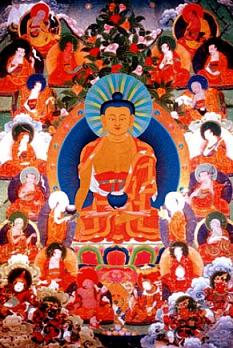Sixteen Arhats: Difference between revisions
Jump to navigation
Jump to search
mNo edit summary |
No edit summary |
||
| Line 3: | Line 3: | ||
'''Sixteen Arhats''' or Sthaviras (Tib. Néten Chudruk; [[Wyl.]] ''gnas brtan bcu drug''; Skt. ''ṣoḍaśa sthavirāḥ''). The Sthaviras or Elders were disciples of the [[Buddha]] who vowed at the time of the [[parinirvana]] to remain in the world and maintain the [[Dharma]] until the time of the future Buddha [[Maitreya]]. To visualize the [[Buddha Shakyamuni]] surrounded by the Sixteen Arhats and an assembly of [[bodhisattva]]s generates great [[merit]] and quickly develops insight into the teachings of the Buddha. | '''Sixteen Arhats''' or Sthaviras (Tib. Néten Chudruk; [[Wyl.]] ''gnas brtan bcu drug''; Skt. ''ṣoḍaśa sthavirāḥ''). The Sthaviras or Elders were disciples of the [[Buddha]] who vowed at the time of the [[parinirvana]] to remain in the world and maintain the [[Dharma]] until the time of the future Buddha [[Maitreya]]. To visualize the [[Buddha Shakyamuni]] surrounded by the Sixteen Arhats and an assembly of [[bodhisattva]]s generates great [[merit]] and quickly develops insight into the teachings of the Buddha. | ||
#Panthaka (Wyl. ''lam pa'')<br> | |||
#Abhedya (Wyl. ''mi phyed pa'')<br> | |||
#Kanaka (Wyl. ''gser can'')<br> | |||
#Bakkula (Wyl. ''bakkula'')<br> | |||
#Piṇḍola Bhāradvāja (Tib. ''bha ra dva ja so nyom len'')<br> | |||
#Mahākālika (Wyl. ''dus ldan chen po'')<br> | |||
#Vajrīputra (Wyl. ''rdo rje mo’i bu'')<br> | |||
#Śrībhadra (Wyl. ''dpal bzang'')<br> | |||
#Gopaka (Wyl. ''sbed byed'')<br> | |||
#Nāgasena (Wyl. ''klu sde'')<br> | |||
#Vanavāsin (Wyl. ''nags gnas'')<br> | |||
#Kṣudrapanthaka (Wyl. ''lam phran'')<br> | |||
#Kanakavatsa (Wyl. ''gser gyi be’u'')<br> | |||
#Aṅgiraja (Wyl. ''yan lag ‘byung'')<br> | |||
#Ajita (Wyl. ''ma pham pa'')<br> | |||
#[[Rahula|Rāhula]], the Buddha's son (Wyl. ''sgra gcan 'dzin'')<br> | |||
===External Links=== | ===External Links=== | ||
Revision as of 08:30, 18 July 2008

Sixteen Arhats or Sthaviras (Tib. Néten Chudruk; Wyl. gnas brtan bcu drug; Skt. ṣoḍaśa sthavirāḥ). The Sthaviras or Elders were disciples of the Buddha who vowed at the time of the parinirvana to remain in the world and maintain the Dharma until the time of the future Buddha Maitreya. To visualize the Buddha Shakyamuni surrounded by the Sixteen Arhats and an assembly of bodhisattvas generates great merit and quickly develops insight into the teachings of the Buddha.
- Panthaka (Wyl. lam pa)
- Abhedya (Wyl. mi phyed pa)
- Kanaka (Wyl. gser can)
- Bakkula (Wyl. bakkula)
- Piṇḍola Bhāradvāja (Tib. bha ra dva ja so nyom len)
- Mahākālika (Wyl. dus ldan chen po)
- Vajrīputra (Wyl. rdo rje mo’i bu)
- Śrībhadra (Wyl. dpal bzang)
- Gopaka (Wyl. sbed byed)
- Nāgasena (Wyl. klu sde)
- Vanavāsin (Wyl. nags gnas)
- Kṣudrapanthaka (Wyl. lam phran)
- Kanakavatsa (Wyl. gser gyi be’u)
- Aṅgiraja (Wyl. yan lag ‘byung)
- Ajita (Wyl. ma pham pa)
- Rāhula, the Buddha's son (Wyl. sgra gcan 'dzin)